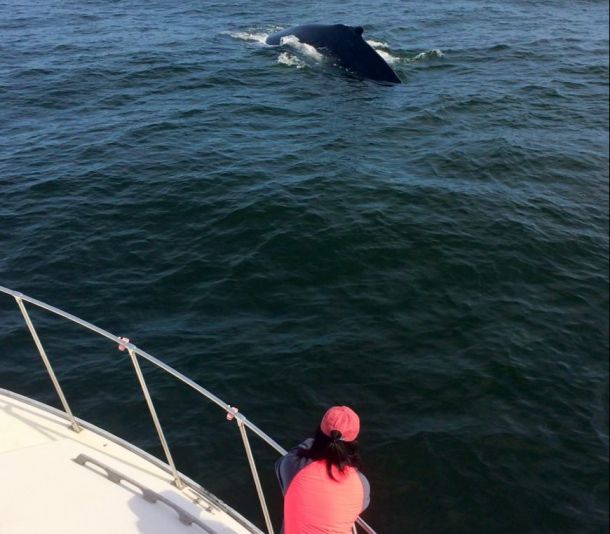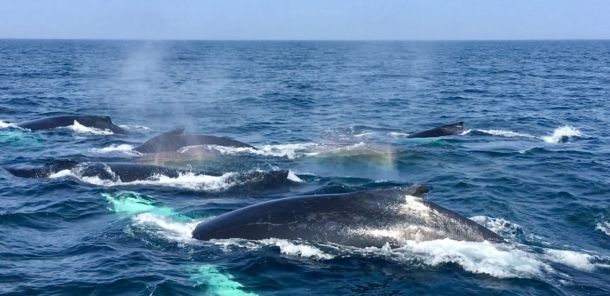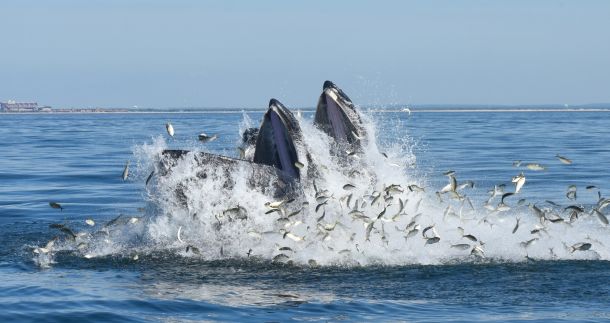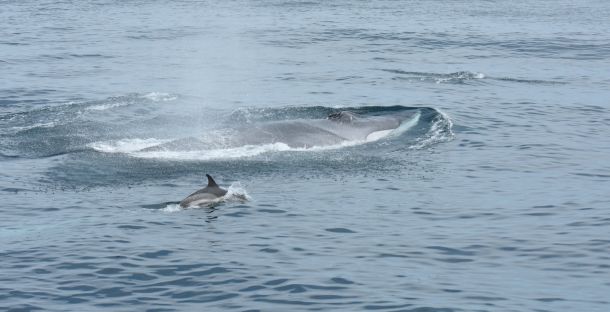This piece comes to us from the Wildlife Conservation Society (WCS). To honor Asian and Pacific Islander Heritage Month, WCS and Nature are sharing stories of nature and conservation.

Emily documenting whales off New York as part of the surveys conducted by the Ocean Giants Program. Photo credit: WCS/Ocean Giants. Photo taken under NMFS MMPA/ESA Permit no.18786-04.
Marine biology. That’s how I introduce what I do to people who look confused when I say “marine mammal conservation research.” Many people imagine a marine biologist as someone who works directly with the animals, so when I say I study whales and work at the Wildlife Conservation Society (WCS) at the Bronx Zoo, people excitedly ask me, “There are whales at the Bronx Zoo?” No, there are no whales at any zoos; but if you spend a few hours on the waters off New York, you may catch a glimpse of one.
As a kid, I wanted to be a dolphin trainer. My brother and I used to play “SeaWorld” in our backyard pool, diving for goldfish (the crunchy snack) until my mom got mad because they clogged the filter. It wasn’t until college, when I started taking classes in marine science, that I learned marine mammal research existed. From there, I got an internship and part-time job in whale acoustics, studied sea otters, went to graduate school, published my thesis on modeling whale habitats and analyzing overlap with human impacts, and landed my current job as a research assistant with the Ocean Giants Program at WCS.

This was the first time an apparent competitive group of humpback whales was documented off New York. Photo credit: WCS/Ocean Giants. Photo taken under NMFS MMPA/ESA Permit no.18786-04.
During the summer and fall, the Ocean Giants team goes out on the water to conduct surveys of whales and dolphins in the New York Seascape (a regional priority for WCS’s New York Aquarium). We record data such as what the animals are doing, where they are, and the environment in which they are seen, including any prey present since New York, seems to be a place where whales come to feed. We also document features that allow us to identify individual animals; for example, we can tell individual humpback whales apart by the unique markings and shapes of their dorsal fins and flukes.
We’ve seen and documented so many captivating moments over the years: cooperative feeding, groups of multiple species (dolphins, humpback, fin, and minke whales) feeding together, mother and calf pairs, and even competitive group behavior (usually a female, with or without a calf, accompanied by multiple males) that’s common on warmer, southern breeding grounds. This research helps inform our understanding of whale distribution and behavior in the waters off New York, which in turn can help inform decisions around how to protect whales from human activities.
It sounds like an aspiring marine biologist’s dream (unless, maybe, you get seasick like me), but getting a foot in the door is harder than it seems. The marine mammal field (and conservation in general) is a privileged field. Many people can’t afford to get work experience because a majority of internships are unpaid, and many marine mammal scientists have done volunteer work (a.k.a, free labor) at some point in their careers. There are even cases where people pay to get experience. Because people of color are disproportionately represented among the economically disadvantaged, it can be harder for them to gain access to the same opportunities.

The Ocean Giants team documented cooperative feeding on menhaden by two humpback whales off New York. Photo credit: WCS/Ocean Giants. Photo taken under NMFS MMPA/ESA Permit no.18786-04.
I am often one of a few, if not the only, person of Asian heritage at various scientific meetings. I’ve always been self-conscious about it, having experienced racist and xenophobic comments and actions growing up, but as I continue further in my career, I am hyper-aware of how different I look from the people around me.
Some people who know me might find this unexpected since I was born and raised in the U.S. My parents immigrated from Taiwan to Boston, Massachusetts in the 1980s and adjusted well: my dad loved the Eagles, Simon & Garfunkel, and the Beatles; my mom made life-long friends at work, and my brother and I were raised on the sports teams of New England (where we were born). But what makes us and our experiences as Asian Americans different is quite literally written on our faces.
Like the recent conversations around representation in film (see Crazy Rich Asians, Marvel’s Shang-Chi, Turning Red), the lack of representation, of seeing someone who looks like me in these meetings, affects the confidence to speak my mind, perpetuates the imposter syndrome I struggle with, makes me uncomfortable at times, and even makes me question if I have a real shot at a future in this field.

Fin whale and common dolphin traveling together, captured by the Ocean Giants team off New York. Photo credit: WCS/Ocean Giants. Photo taken under NMFS MMPA/ESA Permit no.18786-04.
Though I still grapple with these feelings on a daily basis, I find a sense of belonging and comfort in our Asian American & Pacific Islander (AAPI) community and at international meetings when I see people who look like me and speak the same language as I do with my family. I see the steps conservation organizations and the marine mammal community are taking to support diversity initiatives: revamping or forming new Diversity, Equity, and Inclusion (DEI) committees and goals; engaging in racial equity and justice, and welcoming tough but sorely needed conversations.
In the current climate, I remind myself that I’m incredibly lucky to have a job I’m passionate about and to grow in my career during a time when these tough conversations are happening. I am proud of the number of young AAPI speaking up about racism and ‘model minority,’ and the increasing attention to DEI across the sciences. And I’m grateful to have the opportunity to share my story—for those who might look at an AAPI friend, scientist, or colleague with a new perspective, and for those young AAPI marine mammal scientists, who I hope won’t ever feel like a fish out of water.
